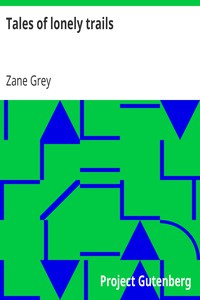Tales of lonely trails by Zane Grey (best affordable ebook reader .TXT) 📗

- Author: Zane Grey
Book online «Tales of lonely trails by Zane Grey (best affordable ebook reader .TXT) 📗». Author Zane Grey
After we had unpacked and while the men were pitching the tents and getting supper I took Romer on a hunt up the creek. I was considerably pleased to see good-sized trout in the deeper pools. A little way above camp the creek forked. As the right-hand branch appeared to be larger and more attractive we followed its course. Soon the bustle of camp life and the sound of the horses were left far behind. Romer slipped along beside me stealthily as an Indian, all eyes and ears.
We had not traveled thus for a quarter of a mile when my quick ear caught the cluck-cluck of turkeys. "Listen," I whispered, halting. Romer became like a statue, his dark eyes dilating, his nostrils quivering, his whole body strung. He was a Zane all right. A turkey called again; then another answered. Romer started, and nodded his head vehemently.
"Come on now, right behind me," I whispered. "Step where I step and do what I do. Don't break any twigs."
Cautiously we glided up the creek, listening now and then to get the direction, until we came to an open place where we could see some distance up a ridge. The turkey clucks came from across the creek somewhere up this open aisle of the forest. I crawled ahead several rods to a more advantageous point, much pleased to note that Romer kept noiselessly at my heels. Then from behind a stone we peeped out. Almost at once a turkey flew down from a tree into the open lane. "Look Dad!" whispered Romer, wildly. I had to hold him down. "That's a hen turkey," I said. "See, it's small and dull-colored. The gobblers are big, shiny, and they have red on their heads."
Another hen turkey flew down from a rather low height. Then I made out grapevines, and I saw several animated dark patches among them. As I looked three turkeys flopped down to the ground. One was a gobbler of considerable size, with beautiful white and bronze feathers. Rather suspiciously he looked down our way. The distance was not more than a hundred yards. I aimed at him, feeling as I did so how Romer quivered beside me, but I had no confidence in Copple's rifle. The sights were wrong for me. The stock did not fit me. So, hoping for a closer and better shot, I let this opportunity pass. Of course I should have taken it. The gobbler clucked and began to trot up the ridge, with the others after him. They were not frightened, but they appeared rather suspicious. When they disappeared in the woods Romer and I got up, and hurried in pursuit. "Gee! why didn't you peg that gobbler?" broke out Romer, breathlessly. "Wasn't he a peach?"
When we reached the top of the ridge we advanced very cautiously again. Another open place led to a steep, rocky hillside with cedars and pines growing somewhat separated. I was disappointed in not seeing the turkeys. Then in our anxiety and eagerness we hurried on, not noiselessly by any means. All of a sudden there was a rustle, and then a great whirr of wings. Three turkeys flew like grouse away into the woods. Next I saw the white gobbler running up the rocky hillside. At first he was in the open. Aiming as best I could I waited for him to stop or hesitate. But he did neither. "Peg him, Dad!" yelled Romer. The lad was right. My best chance I had again forfeited. To hit a running wild turkey with a rifle bullet was a feat I had not done so often as to inspire conceit. The gobbler was wise, too. For that matter all grown gobblers are as wise as old bucks, except in the spring mating season, when it is a crime to hunt them. This one, just as I got a bead on him, always ran behind a rock or tree or shrub. Finally in desperation I took a snap shot at him, hitting under him, making him jump. Then in rapid succession I fired four more times. I had the satisfaction of seeing where my bullets struck up the dust, even though they did go wide of the mark. After my last shot the gobbler disappeared.
"Well, Dad, you sure throwed the dirt over him!" declared Romer.
"Son, I don't believe I could hit a flock of barns with this gun," I replied, gazing doubtfully at the old, shiny, wire-wrapped, worn-out Winchester Copple had lent me. I had been told that he was a fine marksman and could drive a nail with it. Upon my return to camp I tried out the rifle, carefully, with a rest, to find that it was not accurate. Moreover it did not throw the bullets consistently. It shot high, wide, low; and right there I abandoned any further use for it. R.C. tried to make me take his rifle to use on the hunting trip; Nielsen and Lee wanted me to take theirs, but I was disgusted with myself and refused. "Thanks, boys," I said. "Maybe this will be a lesson to me."
We had been up since three o'clock that morning, and the day's travel had been exhausting. I had just enough energy left to scrape up a huge, soft pile of pine needles upon which to make our bed. After that all was oblivion until I was awakened by the ringing strokes of Nielsen's axe.
The morning, after the sun got up, was exceedingly delightful. And this camp was such a contrast to the others, so pleasant and attractive, that even if we had not arranged to meet Lee Haught and his sons here I would have stayed a while anyway. Haught was a famed bear hunter who lived in a log-cabin somewhere up under the rim of the mesa. While Lee and Nielsen rode off up the trail to find Haught I gave Romer his first try at rainbow trout. The water of the creek was low and clear, so that we could see plenty of good-sized trout. But they were shy. They would not rise readily to any of our flies, though I got several strikes. We searched under the stones for worms and secured a few. Whereupon Romer threw a baited hook to a trout we plainly saw. The trout gobbled it. Romer had been instructed in the fine art of angling, but whenever he got a bite he always forgot science. He yanked this ten-inch rainbow right out. Then in another pool he hooked a big fellow that had ideas of his own as well as weight and strength. Romer applied the same strenuous tactics. But this trout nearly pulled Romer off the rock before the line broke. I took occasion then to deliver to the lad a lecture. In reply he said tearfully: "I didn't know he was so—so big."
When we returned to camp, Haught and his sons were there. Even at a distance their horses, weapons, and persons satisfied my critical eye. Lee Haught was a tall, spare, superbly built man, with square shoulders. He had a brown face with deep lines and sunken cheeks, keen hazel eyes, heavy dark mustache, and hair streaked a little with gray. The only striking features of his apparel were his black sombrero and long spurs.
His sons, Edd and George, were young, lean, sallow, still-faced, lanky-legged horsemen with clear gray eyes. They did not appear to be given, to much speech. Both were then waiting for the call of the army draft. Looking at them then, feeling the tranquil reserve and latent force of these Arizonians, I reflected that the Germans had failed in their psychology of American character. A few hundred thousand Americans like the Haught boys would have whipped the German army.
We held a council. Haught said he would send his son Edd with Doyle, and by a long roundabout forest road get the wagon up on the mesa. With his burros and some of our horses packed we could take part of the outfit up the creek trail, past his cabin, and climb out on the rim, where we would find grass, water, wood, and plenty of game.
The idea of permanent camp before sunset that very day inspired us to united and vigorous effort. By noon we had the pack train ready. Edd and Doyle climbed on the wagon to start the other way. Romer waved his hand: "Good-bye, Mr. Doyle, don't break down and lose the apples!"
Then we were off, up the narrow trail along the creek. Haught led the way. Romer attached himself to the bear-hunter, and wherever the trail was wide enough rode beside him. R.C. and I followed. The other men fell in behind the pack train.
The ride was hot, and for the most part all up hill. That basin could be likened to the ribs of a washboard: it was all hills, gorges, ridges and ravines. The hollows of this exceedingly rough country were thick with pine and oak, the ridges covered with cedar, juniper, and manzanita. The ground, where it was not rocky, was a dry, red clay. We passed Haught's log cabin and clearing of a few acres, where I saw fat hogs and cattle. Beyond this point the trail grew more zigzag, and steeper, and shadier. As we got higher up the air grew cooler. I noted a change in the timber. The trees grew larger, and other varieties appeared. We crossed a roaring brook lined by thick, green brush, very pleasant to the eye, and bronze-gold ferns that were beautiful. We passed oaks all green and yellow, and maple trees, wonderfully colored red and cerise. Then still higher up I espied some silver spruces, most exquisite trees of the mountain forests.
During the latter half of the climb up to the rim I had to attend to the business of riding and walking. The trail was rough, steep, and long. Once Haught called my attention to a flat stone with a plain trail made by a turtle in ages past when that sandstone was wet, sedimentary deposit. By and bye we reached the last slopes up to the mesa, green, with yellow crags and cliffs, and here and there blazing maples to remind me again that autumn was at hand.
At last we surmounted the rim, from which I saw a scene that defied words. It was different from any I had seen before. Black timber as far as eye could see! Then I saw a vast bowl inclosed by dim mountain ranges, with a rolling floor of forested ridges, and dark lines I knew to be canyons. For wild, rugged beauty I had not seen its equal.





Comments (0)